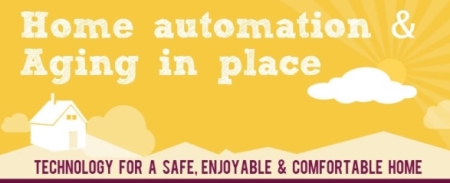Home Automation Technology
Smart Homes for Elderly and Disabled
Home automation
is using technology to have housework or household activities
completed automatically, with little to no intervention from the
user. (Sometimes called a 'smart home'.) It allows an individual
to have remote control of the technology performing the
activities. The goal of home automation is to help create a home
that is easier, more enjoyable and safe to live in.
Essentially, it is simply a way to make things happen in your home, without (or with limited) input from you. In the sciences, it is called Assistive Domotics; automation technology used by the elderly or disabled. It can provide for remote or automatic control of devices or events in your home. Also, it can control what happens in reaction to an event in your home or notify you of an event.
With the advent of home automation, there are now many home systems and related devices that can enable seniors to live in their own homes longer, and still connect to emergency networks if necessary.
Even the early stages of Alzheimer's can be managed with certain automated home features. These devices can help foster a safe and independent living environment for seniors at home, or within a care center community.
Types of Home Automation Technology Devices:
Beginning with wearable technology, the future of home monitoring devices holds a lot of promise. The Apple Watch device plans to offer 10 different sensors, tracking the wearers health and fitness metrics in terms of steps taken, calories burned, sleep quality and heart rate. It also plans to factor in glucose and sweat.ADT, while offering less of a comprehensive health check, has already released devices that are able to contact an operator in the event of an emergency. The device is worn as a pendant or on the wrist, and can also detect if the wearer has fallen. The Philips Lifeline offers a similar service, in the form of a pendant as well. These systems give the senior at home the option of being in constant contact with a helpline, and give worried family members peace of mind knowing their loved one will never be left with no one to turn to.
In the near future, the Wireless Health Institute at UCLA will have a personal activity monitor for seniors that will determine their motions and send the information back to a caregiver.
Other customized services are available for families who have a senior with specific issues. For instance, one service monitors the front door at all times to determine when it is open. If it's open for too long or too frequently, then a message is texted to the senior's family about the issue. GrandCare, which costs between $15 and $25 a day, will create a system designed with your parameters.
Seniors with Alzheimer's face the risk of getting lost and confused when returning home. To prevent this from happening, GPS systems are now being used to locate lost family members. The GPS system is employed automatically, and doesn't require the operation of the one wearing it. Companies such as Aetrex Worldwide offer this option. {12 Best Trackers for the Elderly}
Philips also sells a special medication-dispensing device, which was designed for those who find their memory isn't as sharp as it used to be. A machine contains the medication, with each dosage carefully sorted. An alarm is sounded when they need to take the medication, and the pills are dispensed. If the button on the machine is not pushed after ninety minutes of reminder alarms, then a message text is sent to a designated caregiver.
The tech products of today, created for older people looking to improve and manage their lives, are just the beginning.
The market of technology for seniors is expected to grow from $2 billion to $20 billion in the year 2020.The Institute also hopes to design a type of cane that will measure the pressure exerted on the handle to determine if the user walks with the correct gait.
The tech products of today, created for older people looking to improve and manage their lives, are just the beginning.
The market of technology for seniors is expected to grow from $2 billion to $20 billion in the year 2020.The Institute also hopes to design a type of cane that will measure the pressure exerted on the handle to determine if the user walks with the correct gait.
All of this technology, some of it new and some of it still ahead on the horizon, strives to provide elderly users with the sense of dignity and independence they deserve. At the rate this technology is improving it won't be long before our homes can act as caregivers in their own right.
Author Bio: Beth Kelly is a home security writer for Security Choice where she covers home automation, home security technology and safety issues. She also loves shooting photography in both film and digital. Beth lives and blogs in Chicago, Illinois.
Related Articles:
Home |
About
|
Articles
|
Resources |
Site Map |
Privacy Policy
Elder Options of Texas
Copyright 2001-2024
All Rights Reserved
DISCLAIMER: Links to other websites or references to products, services or publications do not imply the endorsement or approval of such websites, products, services or publications by Elder Options of Texas. The determination of the need for senior care services and the choice of a facility is an extremely important decision. Please make your own independent investigation.


